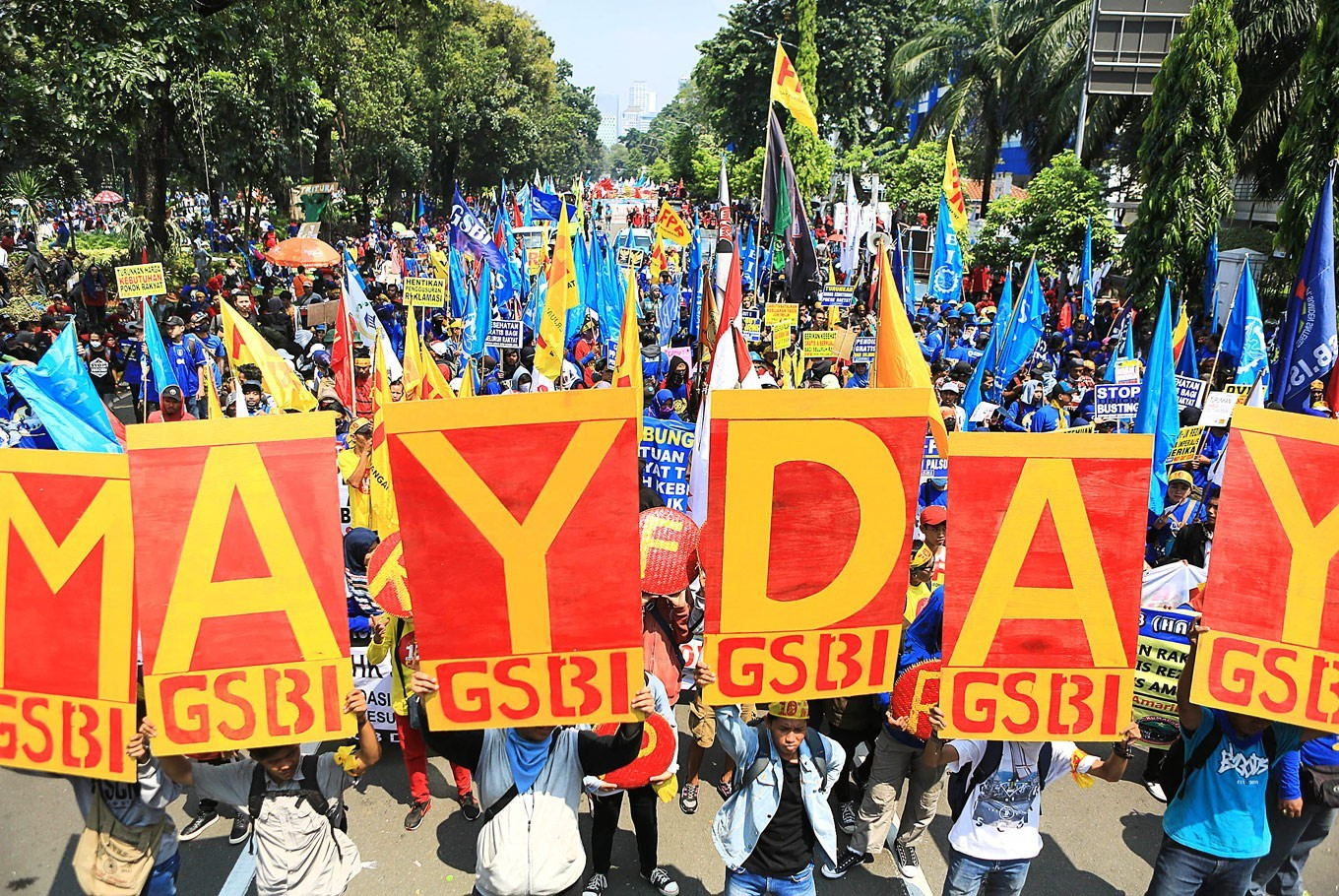News
Prabowo tries to appease workers, not that he needs to
Tenggara Strategics May 13, 2025 Laboring in the street: Workers participate in a May Day rally in Jakarta on Tuesday. They demanded a raise in the minimum wage and the abolishment of outsourcing. (JP/Seto Wardhana)
Laboring in the street: Workers participate in a May Day rally in Jakarta on Tuesday. They demanded a raise in the minimum wage and the abolishment of outsourcing. (JP/Seto Wardhana)
President Prabowo Subianto joined a massive Labor Day rally in Jakarta on May 1, making some promises that went down well with the crowd. However, his appearance seemed to blunt their expressing more radical demands as well as criticisms against businesses and the government.
Prabowo is not pro-labor. His big-tent coalition government includes powerful special interest groups like conglomerates and Muslim organizations with representation in his cabinet. Some of these appointments were granted in return for their support in helping him win the 2024 general election.
Meanwhile, the Labor Party failed to win a single seat in the House of Representatives last year, indicating the party’s low appeal among voters as well as its weak political position and bargaining power. Founded in 2021, the party did not back any of the three presidential candidates, so naturally it was bypassed when Prabowo formed his administration.
Still, May 1 presents a once-a-year opportunity for workers to make a show of force in solidarity and unity. The biggest rally is typically held at National Monument (Monas) Square, a stone’s throw from the presidential palace compound in Central Jakarta.
The mood at this year’s rally was festive, with music and entertainment. Prabowo’s appearance was the highlight of the event, and the leaders of several major unions joined him on stage. After delivering his speech, the President stripped down to his undershirt, throwing his “safari” shirt into the crowd.
This was starkly different from another rally held outside the Senayan legislative complex, where skirmishes broke out between protesters and security forces. Their demands were also more radical and included repealing the 2020 Job Creation Law, which they said was a reflection of the government’s pro-business, anti-labor stance. They also called on the administration to stop the current wave of layoffs and for good measure, the protestors threw in a demand for Prabowo to reverse the current trend of the military entering into civilian affairs.
In his speech at Monas, the President conceded to some long-standing labor demands, including the creation of a national labor council to advise the government on improving workers’ welfare and forming a special task force to handle layoffs to ensure the fair compensation and just treatment of workers.
Prabowo also said he would consider banning outsourcing, although Manpower Minister Yassierli said on May 2 that the government would first consult with stakeholders, including employers, on the matter.
The President also promised to pass the bill on domestic workers’ protection within three months. The bill, which has lingered at the House for more than two decades, would grant domestic workers formal status and all related protections. As informal workers, they are essentially at the mercy of their employers, a condition that has given rise to many cases of abuse including domestic slavery.
The bill is included on the 2025 National Legislation Program (Prolegnas), indicating that we might expect see some progress in the coming months.
And if Prabowo stays true to his word, the labor movement will soon have a national heroine in Marsinah, a factory worker and labor activist in East Java who was brutally murdered in 1993, allegedly by her employer who was collaborating with the military “in the name of stability”. This phrase was a code word for the military to take repressive measures during the authoritarian New Order regime of Soeharto, the country’s second president who came to power in 1965 and ruled for seven terms.
The government confers national hero status posthumously each year, and Soeharto is one of the 2025 candidates. He was also Prabowo’s father-in-law until his ouster in May 1998, precipitated by the Asian financial crisis and the pro-democracy reform movement. That same month, his daughter Siti “Titiek” Hediati Hariyadi and Prabowo divorced.
In his Labor Day speech, Prabowo promised to hold a gathering soon at Bogor Palace of 160 representatives each from labor and business. “I will tell the businesspeople, if you are going to get rich, you can’t go it alone,” he told a cheering crowd.
His appearance at the rally looks more like an attempt to co-opt some union leaders rather than his coalition government addressing or adopting certain labor demands.
The country’s labor movement is fragmented with 21 confederations, 198 federations and more than 12,000 company unions. They each have a different agenda and competing interests, which was observed in the competing demands expressed on Labor Day, a time when they should ideally stand united.
In addition, the unionization rate in Indonesia is low at less than 3 percent, meaning that 4 million workers from a nationwide workforce of nearly 140 million are registered members of a union. This also means that labor unions can hardly claim to represent all workers in the country.
The labor movement is politically weak, but Prabowo seems to find it worth keeping some labor leaders on his side and giving in to some of their demands. At the end of the day, the retired Army general and owner of a business empire is decidedly pro-business, and this is likely to inform his agenda, notwithstanding his appearance at a Labor Day rally.
What we've heard
An official in the labor sector said Prabowo’s promise to establish a workers' welfare council, a layoff task force, the elimination of outsourcing, and the long-overdue passing of the domestic workers bill would be realized through regulations. A ministerial regulation, for example, will be issued to address the controversial matter of outsourcing.

